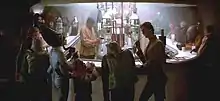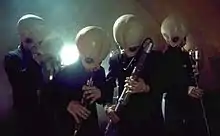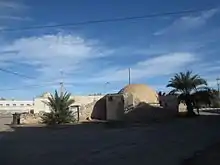Mos Eisley
Mos Eisley is a spaceport town in the fictional Star Wars universe.[1] Located on the planet Tatooine, it first appeared in the 1977 film Star Wars, described by the character Obi-Wan Kenobi (played by Alec Guinness) as a "wretched hive of scum and villainy".
| Mos Eisley | |
|---|---|
 Interior set of the Mos Eisley Cantina with cast of aliens, as seen in Star Wars (1977) | |
| First appearance |
|
| Created by | George Lucas (writer); John Mollo (designer) |
| Genre | Space opera |
| Information | |
| Type | Spaceport |
| Race(s) | Humans; various non-human species |
| Location | Planet Tatooine |
| Notable characters | Wuher, Han Solo, Chewbacca, Greedo, Ponda Baba, Doctor Evazan, Figrin D'an and the Modal Nodes, The Mandalorian, Garindan |
A notable scene set in a seedy Mos Eisley cantina crowded with numerous alien races made a particular impact on audiences. Location filming for the spaceport took place from 1975–76 in Tunisia, with interiors filmed at Elstree Studios in London.
Depiction
Film

Mos Eisley made its first appearance in the original 1977 film, Star Wars. It is depicted as a busy, bustling port city situated in a desert plain, populated with transients of all species. The lawless spaceport attracts criminals, smugglers and fugitives.[2] Spacecraft land at docking bays dotted across the city.
The Mos Eisley scenes occur early in Star Wars, when the young hero Luke Skywalker and his mentor Obi-Wan Kenobi travel to the spaceport in search of a pilot, accompanied by the droids, C-3PO and R2-D2. Obi-Wan warns Luke that the spaceport may be dangerous. Upon arrival, Luke and Obi-Wan enter the cantina, a dimly-lit tavern patronised by visiting starship pilots. Strong drink is on sale at the bar and there are frequent outbreaks of violence among the clientele. The cantina attracts a range of exotic alien species, although droids are not permitted to enter — the bartender orders them to leave, saying "We don't serve their kind in here". A band of domed-headed aliens plays a set of otherworldly jazz-style music.[3][4] Luke is threatened with violence by two of the customers, Ponda Baba, an Aqualish, and Doctor Evazan, a deformed human, but Obi-Wan intervenes with his lightsaber, cutting Ponda's arm off in the fight. This is the first time a lightsaber is used in combat on-screen in the Star Wars franchise. Obi-Wan introduces Luke to a pair of smugglers, Chewbacca and Han Solo, and they negotiate terms for passage to the planet Alderaan. After Luke and Obi-Wan have departed, Han is involved in a brief confrontation with Greedo, a green-skinned gangster; the exchange ends violently when Han shoots Greedo dead.[5][6] As the group prepare to leave, they are followed to Docking Bay 94 by Garindan, a spy working for the Empire. Following a brief gunfight with Imperial stormtroopers, they board the Millennium Falcon spaceship and take off from Tatooine.
Books
In the novelization of the film, Star Wars: From the Adventures of Luke Skywalker by George Lucas (ghostwritten by Alan Dean Foster), Mos Eisley is described as a haphazard, run-down settlement built of concrete and sandstone, a large part of it built underground to escape the heat of Tatooine's twin suns.[7] The cantina is described as a dark, sinister bar full of "one-eyed creatures and thousand-eyed, creatures with scales, creatures with fur". The narrative describes "Tentacles, claws and hands... wrapped around drinking utensils".[8]
The Expanded Universe anthology of intertwined short stories, Tales from the Mos Eisley Cantina, edited by Kevin J. Anderson, explores the cantina and its clientele further. The book names the establishment as "Chalmun's Cantina", introducing its proprietor as a Wookiee named Chalmun; it also reveals that the bartender is named Wuher. The book also explores the reasons for the cantina's ban on droids: the bartender claims to dislike everyone, but lashes out at droids because they are the only thing that will not try to fight back; the proprietor Chalmun does not tolerate droids because they do not drink, and therefore occupy valuable space. The backstory of the cantina's resident swing band is also expanded in the short stories "We Don't Do Weddings: The Band's Tale" by Kathy Tyers and "Empire Blues" by Daniel Keys Moran. The band is named as Figrin D'an and the Modal Nodes and it is revealed that the players belong to a race called Bith. Their main musical number is also given a title, "Mad About Me".[9]
Television
Mos Eisley appears in the 2019 Star Wars television series, The Mandalorian. In "Chapter 5: The Gunslinger", the Mandalorian is forced to set down in Mos Eisley for repairs after a space battle with another bounty hunter. In order to pay for the repairs, the Mandalorian goes to a local cantina to look for a bounty. There, he meets a rookie bounty hunter, Toro Calican, who hires him to help locate Fennec Shand, a dangerous mercenary. The pair locate Shand just beyond the Dune Sea and apprehend her. However, when the Mandalorian goes to retrieve transport for them, Shand tries to turn Calican against him by telling Calican about the Mandalorian turning against the bounty hunter guild to rescue the child. Calican kills Shand and decides to capture the Mandalorian and the child and collect all three bounties. The Mandalorian, however, is able to overcome Calican and rescue the child and Peli, a mechanic that was repairing his ship and watching the child. The Mandalorian gives Peli the reward for Shand as payment for the repairs and he and the child depart Tatooine.
Production
Filming
.jpg.webp)
The first view of Mos Eisley in Star Wars is a shot of Death Valley in California from the Dante's View lookout, with a matte painting added in the distance. The actual filming on location took place on the Tunisian island of Djerba.
In 1975, during the early stages of production on Star Wars, the appearance of the Mos Eisley cantina and its clientele was realized through the work of concept arts Ron Cobb, Rick Baker and Ralph McQuarrie and costume designer John Mollo.[10][11] Mollo worked with George Lucas to compile a chart of visual designs for a range of character types. In collaboration with Mollo, make-up artist Stuart Freeborn designed the masks and prosthetics to match each of the costumes, along with Doug Beswick, Rick Baker, Phil Tippett,[12] Nick Maley and Christopher Tucker.[13] Freeborn has remarked that the cantina scene was specifically set up to be a "shock" scene — until this point in the film, there had been few appearances of non-human creatures, and the entrance into the cantina suddenly presented the audience with an array of outlandish species. Working from Lucas's direction and a maquette, set designer John Barry created the cantina set complete with circular bar and shady alcoves. Mollo included a few costumes borrowed from Westerns, and based some other costumes on characters from the 1950 film Destination Moon and the 1960s television series Lost in Space.[14] The alien musicians in the band were played by a number of the Industrial Light & Magic crew, including Phil Tippett, Jon Berg, Rick Baker, who all mimed to the Benny Goodman tune "Sing, Sing, Sing" at George Lucas's suggestion.[12]
_(4940421973).jpg.webp)
The exterior scene was initially filmed in 1976 at the little town of Ajim, which is a fishing port on the Isle of Djerba, Tunisia. The film crew added some false frontage to the structure, which has seen no refurbishment since 1976. The local owner was reimbursed eight dollars a day.[15] The interior set was constructed and filmed on Stage 6, Elstree Studios in London.[16] Harrison Ford filmed his first scene with Alec Guinness — Ford later remarked that the prospect of working with Guinness "scared the shit out of me".[14] As filming progressed, Lucas encountered many problems; the production was running over-budget and both cast and crew were suffering health problems. Stuart Freeborn fell ill and was unable to complete his work on the cantina creature masks.[17]
In early 1977, under pressure to complete his movie (now more than $2 million over budget), Lucas negotiated limited additional funding from 20th Century Fox executives to support second unit filming. Some of the most important additional footage shot was to enhance the cantina scene at Hollywood Center Studios. Lucas had been dissatisfied with the make-up in previous shots due to Freeborn's illness, and was now able to fully realize the scene with several close-ups of alien creatures, complete with Freeborn's masks. Lucas also supplemented the limited coverage he had from the Tunisia footage with footage from Death Valley.[18] The new material was cut into the film by Lucas's editors, including Lucas's wife Marcia Lucas.[14][19][6]
Lucas remained dissatisfied with the final cut of the cantina scene, and when Lucasfilm released the Special Edition of Star Wars in 1997, Lucas made a number of changes to the shots. In the opening sequence of the cantina scene, a sinister werewolf-type character was replaced by a CGI pipe-smoking reptile.[20] The second change to the cantina scene was an adjustment to the confrontation between Han Solo and Greedo, which altered the rapid sequence of action so that Greedo is shown to fire the first shot. This change has proved one of the most controversial among Star Wars fandom, and gave rise to the popular slogan "Han shot first" in objection to the alteration.[21]

Music
Throughout the cantina scenes in Star Wars, there is constant background music played by an alien band. This diegetic music was composed for the film by John Williams, and consisted of two pieces written for trumpet, three saxophones, clarinet, Fender Rhodes piano and percussion, along with steel drum and synthesizer. George Lucas briefed Williams to imagine "several creatures in a future century finding some 1930s Benny Goodman swing band music ... and how they might attempt to interpret it". Williams combined traditional jazz instruments with instruments associated with Afro-Caribbean music in order to create a sound that was "both alien and yet familiar at the same time."[22][23][24][25]
Spin-off merchandise
Toys
In 1978 the toy manufacturer Kenner Products released a Cantina Adventure Set as part of its range of Star Wars action figures. The playset consisted of a miniature plastic bar with a cardboard backdrop depicting various cantina creatures and an Imperial stormtrooper. A second version of the playset was brought to market in 1979, named the Creature Cantina Action Playset.[26]
In September 2020, LEGO Released a Master Builder Series (MBS) Mos Eisley Cantina (set number: 75290). It featured 3,187 pieces, 21 Minifigures and cost $349.99 USD/EUR.[27][28]
Music releases
The first piece of music from the Cantina scene was released in 1977 on the Star Wars Original Motion Picture Soundtrack, entitled simply "Cantina Band". Later CD re-releases of the soundtrack album included the second piece, which was titled "Cantina Band #2". The first "Cantina Band" number has since been retitled "Mad About Me".[25]
That same year, the record producer Meco released a space disco version of the Star Wars title theme and "Cantina Band" on his single "Star Wars Theme/Cantina Band".[29] Since then, numerous popular cover versions and parodies have been released which feature the "Cantina Band" melody, including "Star Wars Cantina" (1996) by Mark Jonathan Davis, a parody song of Barry Manilow's "Copacabana";[30] "Cantina Band" (1995) by the rock band Ash, as the B-side of their single "Girl From Mars";[31] "Digga Digga Doo" (2004) by the Asylum Street Spankers, from their 2004 album Mercurial;[32] and "Cantina" (2007) by Voltaire from his album Ooky Spooky;[33] A bluegrass version of the theme is heard during the bar scene in the 2011 film Paul, recorded by Syd Masters and The Swing Riders.[34]
References
Footnotes
- The hanging props seen depict those which were reused in the design of IG-88 in The Empire Strikes Back (1980).
Citations
- "Spaceports". Orbital Vector. 25 March 2010. Retrieved 15 January 2017.
- "Mos Eisley Spaceport". StarWars.com. Archived from the original on 26 September 2018. Retrieved 26 September 2018.
- "Star Wars Databank: Mos Eisley Cantina". StarWars.com. Archived from the original on 6 July 2018. Retrieved 7 July 2018.
- Windham, written by Ryder (2005). Star Wars the ultimate visual guide (1st American ed.). London: Dorling Kindersley. p. 80. ISBN 9780756614201.
- "Ponda Baba". StarWars.com. Retrieved 7 July 2018.
- "7 Things You Might Not Know About the Mos Eisley Cantina | StarWars.com". StarWars.com. 27 January 2015. Archived from the original on 6 July 2018. Retrieved 6 July 2018.
- Lucas 1976, p. 75.
- Lucas 1976, pp. 78-79.
- Anderson, Kevin J., ed. (1995). Tales from the Mos Eisley Cantina. New York: Bantam Books. ISBN 9780553564686.
- Titelman, Carol; Hoffman, Valerie, eds. (1979). The Art of Star Wars (1st ed.). New York: Ballantine Books. pp. 61–63. ISBN 0345282736.
- Scoleri, John (14 January 2014). "An Annotated Guide to The Star Wars Portfolio by Ralph McQuarrie". StarWars.com. Lucasfilm. Archived from the original on 24 June 2017. Retrieved 24 June 2017.
- "9 Things You Might Not Know About the Aliens of Star Wars: A New Hope | StarWars.com". StarWars.com. 24 May 2017. Retrieved 8 July 2018.
- "The 'Star Wars' Cantina Scene: The Out-of-This-World Story Behind the Galaxy's Favorite Dive Bar". uk.movies.yahoo.com. Retrieved 2019-02-13.
- Rinzler, J. W. (2007). The Making of Star Wars: The Definitive Story Behind the Original Film. New York: Del Rey Books. ISBN 978-0-345-47761-3.
- Daniels, Anthony (2019). I Am C-3PO: The Inside Story. DK. ISBN 9781465492562.
- Hearn 2005, pp. 116-7.
- Hearn 2005, p. 104.
- Hearn 2005, p. 106.
- "Mos Eisley Cantina". starwars.com.
- Woodward, Malcolm Campbell and Tom. "Star Wars: The Changes". www.dvdactive.com. Archived from the original on 8 July 2018. Retrieved 8 July 2018.
- "Han Shot First". Know Your Meme. Retrieved 8 July 2018.
- Williams, John (2004). Star Wars Episode IV: A New Hope Audio CD (Original Motion Picture Soundtrack CD) – liner notes. MCA. ASIN B0002YCVIS.
- Kinos-Goodin, Jesse. "5 things you didn't know about the Star Wars Cantina band (unless you are a total Star Wars nerd)". CBC Music. Retrieved 7 July 2018.
- Zdenek, Sean (2015). Reading Sounds: Closed-Captioned Media and Popular Culture. University of Chicago Press. p. 238. ISBN 9780226312781. Retrieved 7 July 2018.
- Bartkowiak, Mathew J. (2012). Sounds of the Future: Essays on Music in Science Fiction Film. McFarland. pp. 91–92. ISBN 9780786456505. Retrieved 7 July 2018.
- "Kenner's Star Wars Playsets, Part 1: Cardboard Death Stars and Creature Cantinas". StarWars.com. 5 February 2014. Archived from the original on 10 March 2018. Retrieved 6 July 2018.
- Lego Group (9 September 2020). "This Place Can Be A Little Rough - The LEGO Group Announces LEGO® Star Wars™ Mos Eisley Cantina™ Construction Set From Star Wars: A New Hope". Lego.com. Lego. Retrieved 9 September 2020.
- LEGO Star Wars Mos Eisley Cantina - LEGO Designer Video 75290. October 28, 2020 – via YouTube.
- "MECO". Official Charts Company. Retrieved 8 July 2018.
- Burton, Bonnie. "Richard Cheese: Star Wars Swings!", 12 May 2006. reprinted online at Interviews of Richard Cheese at Cheese's website.
- "Ash's debut album 1977: 20 things you (probably) didn't know". WOW247.
- Rawls, Alex. "A Good Spanking". The Advocate. Retrieved 27 September 2018.
- "Music". www.voltaire.net. Aurelio Voltaire. Retrieved 27 September 2018.
- Ditzian, Eric. "'Paul': Five Secrets Revealed". MTV News. Retrieved 8 July 2018.
Sources
- Lucas, George (1976). Star Wars: From the Adventures of Luke Skywalker (1st ed.). New York: Ballantine Books. ISBN 0-345-26061-9.
External links
- Mos Eisley — Star Wars Databank
- Mos Eisley Cantina — Star Wars Databank
- Mos Eisley on Wookieepedia, a Star Wars wiki.
- Mos Eisley Cantina on Wookieepedia, a Star Wars wiki
